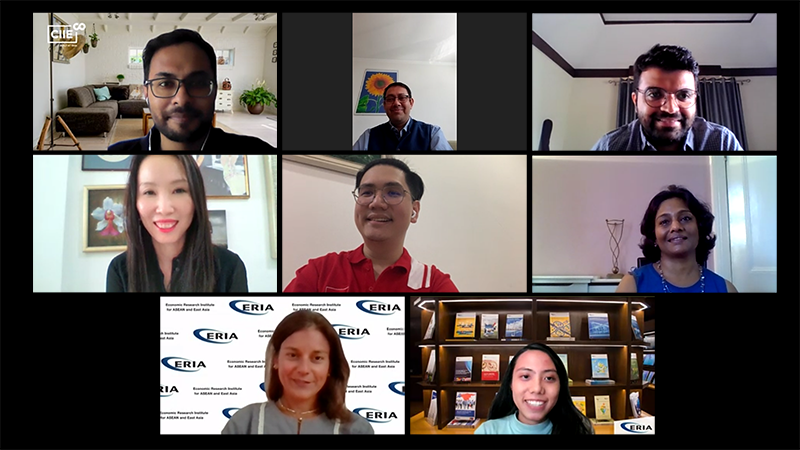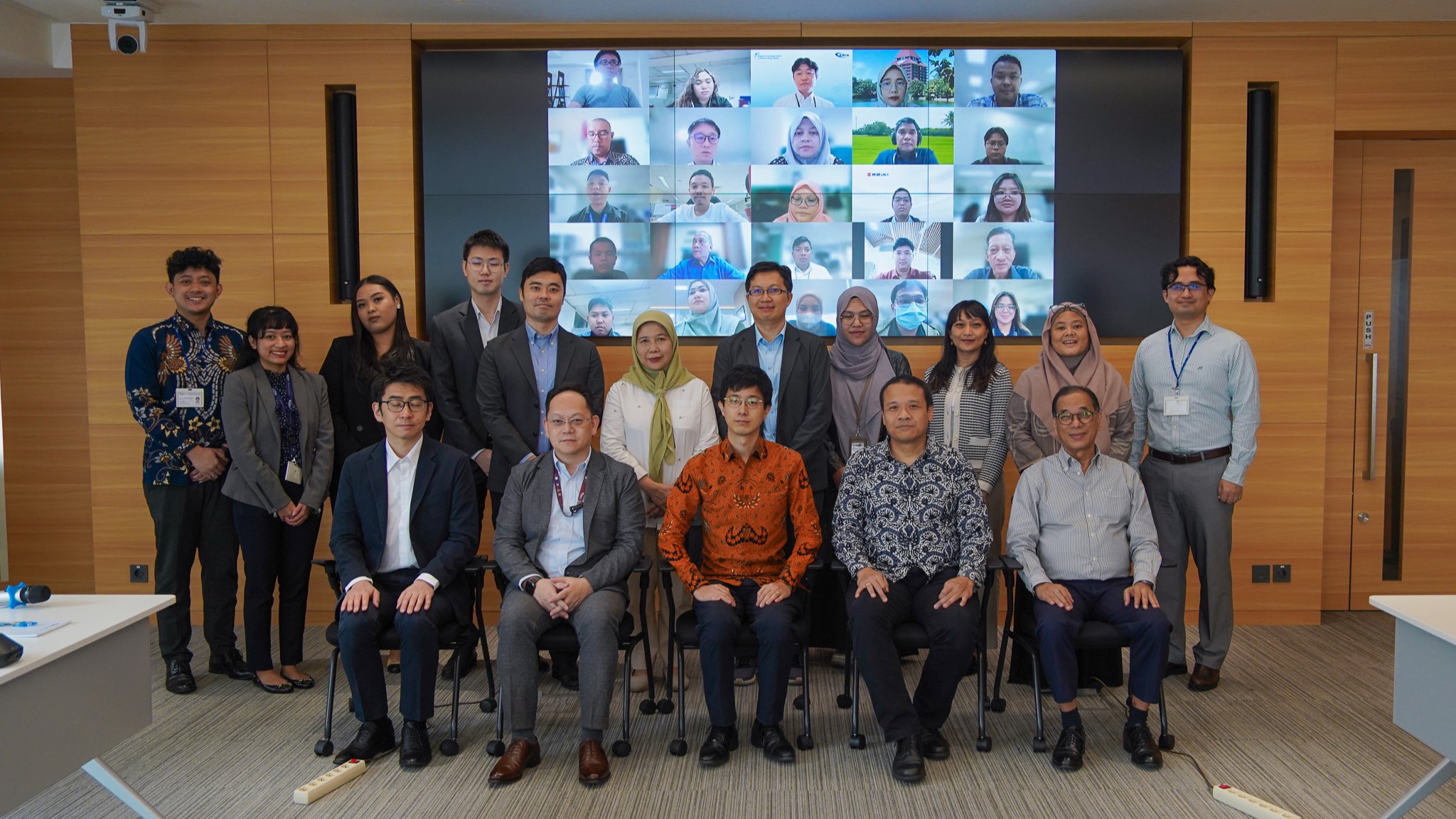Analysing Healthtech Ecosystem across ASEAN and India: Technology, Innovation, and Policy Lenses ǀ ERIA-CIIE.CO Webinar Series Ep #2
Date:
8 September 2021Category:
NewsTopics:
ASEAN, India, Strategy and Partnership Programme, TechnologyShare Article:
Print Article:
Jakarta/Ahmedabad, 8 September 2021: Over the years, rapid adoption of technology has brought transformation to healthcare services and systems, with digital tools bringing healthcare solution such as telemedicine and e-pharmacy to consumers’ fingertips. While the Covid-19 pandemic has pushed the healthcare system to the brick of collapse, many private companies and governments are increasingly using digital services to act as a force multiplier in delivering health products and services for the public.
Across ASEAN and India, the healthtech sector is considered a fast-growing sector with a growing market size, capturing millions of mobile internet users as consumers in the region. However, the robust healthtech innovation is continually followed by the pressing need for a better digital health governance, addressing issues from data security and privacy to policy regulation to better accommodate the needs of region’s stakeholders. Moving forward, it is critical for ASEAN and India to not only discuss the development and future trajectory of healthtech, but also the gaps in the current healthtech ecosystem. There are many opportunities for policy learning across the two regions, who face similar challenges and opportunities.
On 8 September 2021, ERIA and the CIIE.CO, jointly organised a second online dialogue ‘Technology and Distribution Innovation in Healthtech’ focused on building the entrepreneurship ecosystem in ASEAN with insights from India,
Four speakers from ASEAN and India shared their perspectives on the development and way forward in Healthtech:
- Dr Satya Prakash Dash; Founding & Former Head Strategy, BIRAC India, Board Member Venture Center, India
- Ms Nita Tyagi, Platform Adoption Architect, Program Director - National Urban Stack Uttarakhand, India; Core Volunteer at iSPIRT National Health Stack, India;
- Ms Von Leong, Co-founder & General Partner, Purpose Venture Capital, Singapore
- Mr Alfonsius Timboel, Chief Product Officer, HaloDoc, Indonesia
Dr Satya Prakash Dash, Founding & Former Head Strategy, BIRAC India, Board Member Venture Center, India shared his perspective on the development of medtech and biotech innovation ecosystem in India over the past decade. He highlighted the increasing risk-taking culture for many start-ups, institutions and companies that is necessary to support the robust technology application in India’s healthcare innovation and infrastructure. Even though the growing role of incubators and private funding in healthcare innovation has been supported by the policy push from the Indian government, he underscored several gaps that needed to be bridged as follow: access to clinical testing sites for start-ups with higher technology level, access to appropriate funding to validate and commercialize healthtech start-ups and market setting policies such as procurement in healthcare system.
Ms Von Leong, Co-founder & General Partner, Purpose Venture Capital, Singapore shared her perspective as a private impact investor in health and biotech in Southeast Asia (SEA), where healthtech is considered one of the best performing service-techs in terms of activity flow and the market size. Indonesia, Singapore, Malaysia and Vietnam held most of the region’s shares of capitals. Furthermore, she highlighted how government’s role is not only to provide regulation but also to invest in R&D infrastructure, creating venture funds from the sovereign wealth funds, and setting up institutions and incubators in the country. Von also highlighted the role of multi-stakeholder collaboration and impact investing in supporting telemedicine and e-pharmacy to best deliver the right quality and cost effectiveness of healthtech.
Ms Nita Tyagi, Platform Adoption Architect, Program Director - National Urban Stack Uttarakhand, India; Core Volunteer at iSPIRT National Health Stack, India highlighted her experience in creating the National Digital Health Blueprint in India. She mentioned how the digital health strategy was built to solve the complex problems of India’s healthcare such as access to integrated healthcare data. She emphasized one of the important efforts to connect and coordinate many healthcare data from private to public resources to build a standardize framework. From her perspective, having the digital national framework alone will not be efficient as it needs to be embedded into law/regulation, along with a regulation on the personal data protection. Furthermore, she emphasized the importance of giving the right incentives for institutions with trusted data and educating Indian people about data consent.
Mr Alfonsius Timboel, Chief Product Officer, HaloDoc, Indonesia highlighted his experience in building Halodoc, an Indonesian-based healthtech provider that aims to simplify healthcare access through technology. He captured the initial issues that inspired the start of Halodoc namely: the geographical challenges of Indonesia, scarcity of hospital beds, medics and doctors. Combining telemedicine, e-pharmacy and e-consultation in one application, Halodoc was built to solve these issues. In his perspective, the pandemic has accelerated the market opportunity as well as public-private partnership collaboration where Halodoc now also plays a role as a digital distribution of vaccines. Furthermore, he emphasized making a strategic partnership with the healthcare providers (e.g: doctor associations and hospitals) and the payers (e.g: government, insurance providers) to scale up the healthtech business and ecosystem.
The webinar was co-hosted by Dr Giulia Ajmone Marsan, ERIA Director for Strategy and Partnership, and moderated by Mr. Chintan Antani, AVP-Seed Investments and Portfolio, CIIE.CO. During the Q&A session, moderated by Mr. Antani, speakers discussed how new technology can better be adopted and translated by both government and the public. Moreover, speakers also highlighted the future challenges in healthtech where data standardization is critical to provide a better digital health services.
The roundtable was jointly organised by CIIE.CO, a leading innovation centre and incubator at the Indian Institute of Management in Ahmedabad, and ERIA, under the Strategy and Partnership Programme, funded by Australia.







